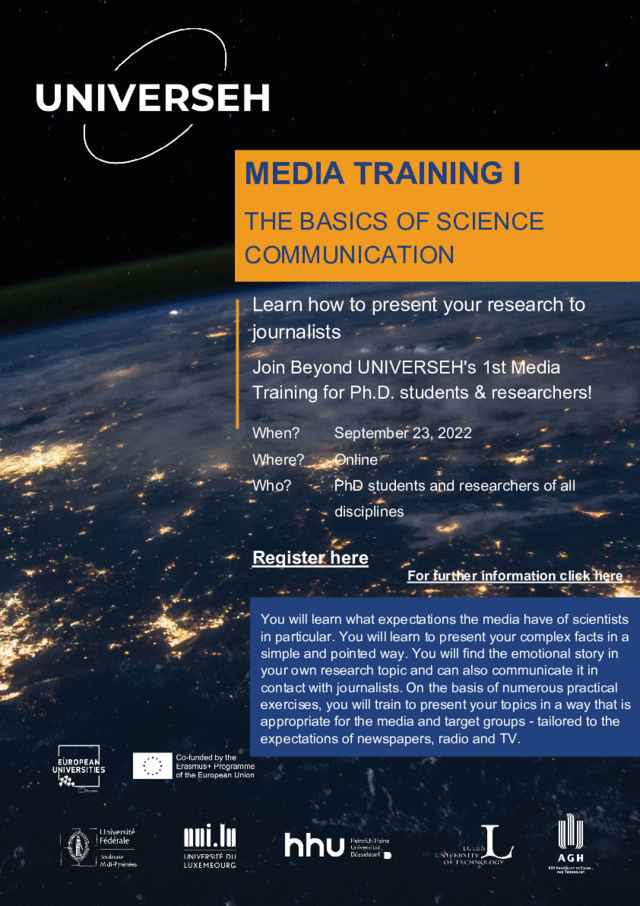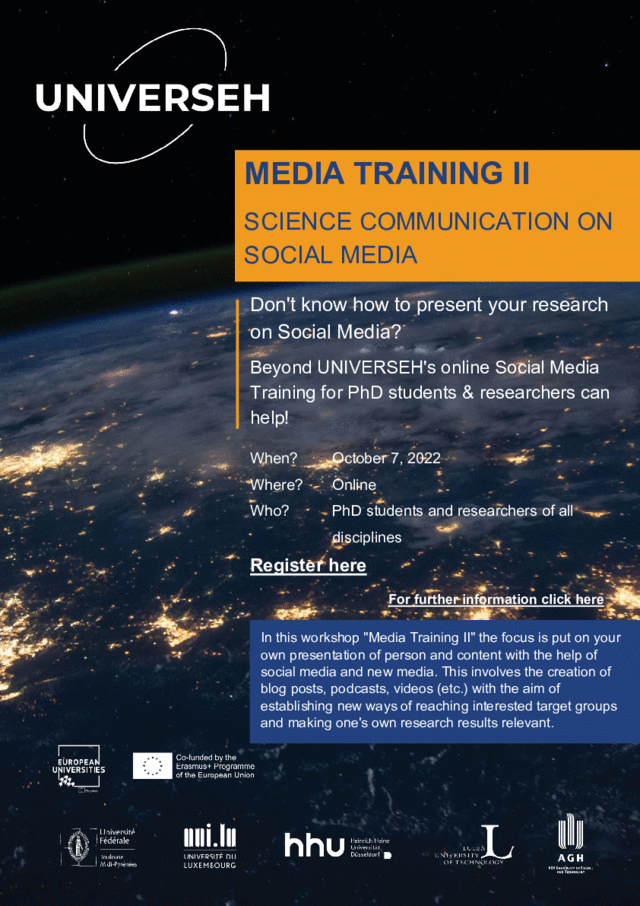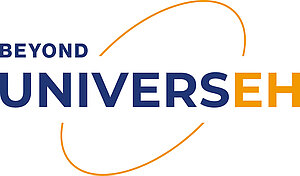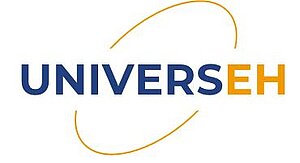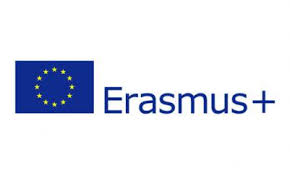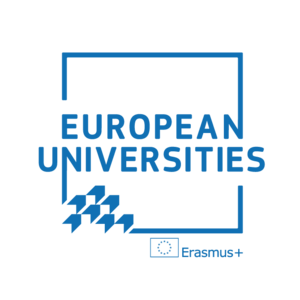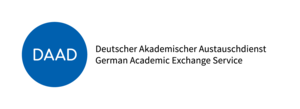Training, Workshop & other Events

UNIVERSEH-Alliance helps with the development of entrepreneurship and communication workshops and trainings focused directly and indirectly with Space topics. Interested students interact with miscellaneous professionals around the themes.
Specially practical workshops where students have to work together on projects, are also part of the curricula, thus fostering the acquisition of skills needed on the job market.
Upcoming Events

Space exploration is an area of research traditionally associated with science and technology. However, many key questions regarding space also concern social sciences and humanities, as space activities have clear social, cultural and economic impacts on our societies. Clearly, there is a need for such a multidisciplinary approach. Therefore, the Beyond UNIVERSEH event aims to explore the importance of the humanities for space research with experts on the matter and to enable networking between policymakers, companies, researchers, and interested citizens.
Find further information about the event and how to register here.
Programme
13.30 Registration - please choose your card and sign the waivers, if needed
14.00 Start of the Impulse Speeches and Panel discussion
Moderator
Laetitia Cesari, Space Law, University of Luxembourg
Laetitia Cesari is a doctoral researcher at Luxembourg University and conducts research on space security for international organisations. She specialises in Space Law and Policy, focusing on security and safety aspects, space traffic management, and space situational awareness. She also studies the nexus between space and cybersecurity.
Panellists
Prof. Dr. Annick Castiaux (Rector)
Annick Castiaux is the rector-president of the University of Namur, in Belgium. She has a PhD in Physics. After her PhD, she spent some years in the private sector as a consultant in information management. She came back in the academic world in 2002 to develop teaching and research in innovation and technology management. In 2015, she created the Creativity and Innovation Research Center (CIRCe), one of the centers of Namur Digital Institute. Her research looks at sustainable and responsible innovation, innovation ecosystems and, more recently, digital sources of innovation, as data or AI.
Prof. Dr. Stefan Marschall (Vice Rector of International Affairs)
Stefan Marschall is chair of German Politics at the department of Social Sciences of the Heinrich-Heine-University of Düsseldorf and since 2019 Vice President for International Relations and Science Communication. He is a specialist on the political system of Germany, on comparative as well as transnational parliamentarism and especially on political (online) communication and participation. As Vice President, Stefan is Project Leader and Official Representative of HHU in the European University Alliance UNIVERSEH. In the Rectorate he is also in charge of the diversity management strategy of HHU as well as for the internal tenure evaluation processes.
Dr. Jens Temmen (Assistant Professor in English and American Studies)
Jens Temmen is an assistant professor in American Studies at Heinrich-Heine University Düsseldorf. He received his PhD in American Studies at the graduate school “Minor Cosmopolitanisms” at the University of Potsdam with a thesis on The Territorialities of U.S. Imperialism(s). His second book project focuses on North American astroculture in the Second Space Age and in relation to planetary discourse, a topic on which he has also published widely. He is fellow of the Young Academy of Sciences and Literature (Mainz) and co-editor of the book series Critical Futures (transcript).
Prof. Dr. Christina Stange-Fayos (Vice-Chair responsible for European and International Relations)
Christina STANGE-FAYOS is professor of German History and Civilisation, currently Vice President « Europe/International » at the University of Toulouse (https://www.univ-toulouse.fr/universite/president-et-son-equipe) and provisional administrator of the Franco-Mexican University House (MUFRAMEX).
She helped set up a consortium of European universities, of which Toulouse is the leader, UNIVERSEH: European Space University for Earth and Humanity. Equality between men and women in education systems, as well as the responsible and inclusive development of the academic world, are among its priorities, as are issues of interculturality and multilingualism. She is a member of the DFH/UFA's University Council, and a key player in the debate on ideas between France and Germany.
Prof. Dr. Vincent Simoulin (Sociology Professor)
Vincent Simoulin () is professor of Sociology at the University of Toulouse 2 Jean Jaurès and researcher at CERTOP (research center on sociology of work, organizations and policies). His research focuses on the sociology of science, organisational change and territorial governance.
16.00 Networking with drinks and snacks
17.30 End of the event
Past events
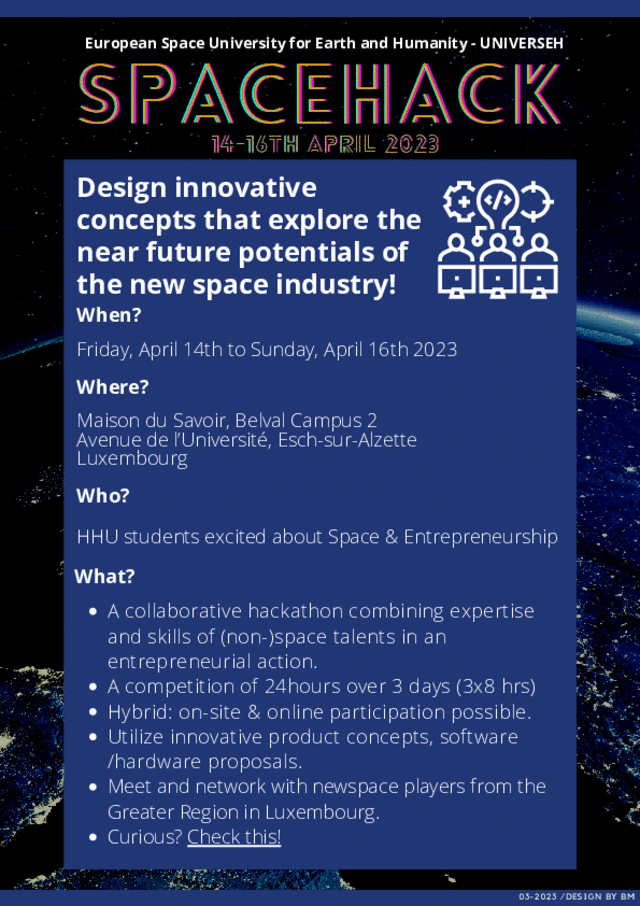
SpaceHack 2023 Luxembourg
When? 14-15-16th April 2023 - à 3x8hrs hackathon on 3 days
Where? Hybrid model, both on-site in Luxembourg-belval and online for remote participants
Target group: students, researchers and professionals
Registration open till 15th March!
SpaceHack is a hackathon, a collaborative event meant to combine the expertise and skills of space and non-space talents in a collective entrepreneurial action. The scope of participating teams is to design innovative concepts that explore the near future potentials of the new space industry.
The third edition of the hackathon is organised by Technoport SA, UNIVERSEH European Space University, InTech, European Space Resources Innovation Centre (ESRIC) and Digital Learning Hub Luxembourg.
Space WEBinar
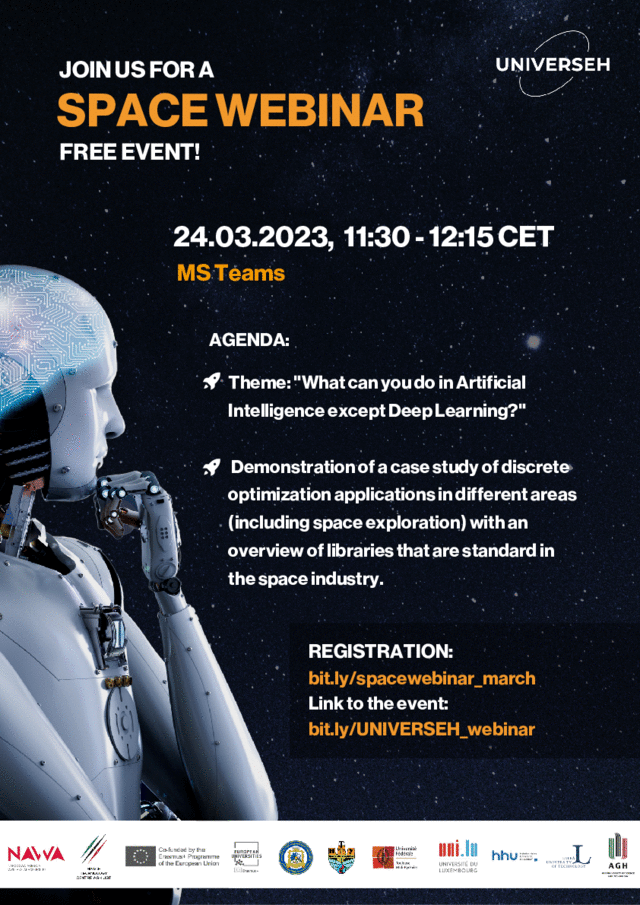
SPACE WEBINAR: What can you do in Artificial Intelligence except Deep Learning?
AI algorithms and their applications in the space industry
24th March 2023 at 11:30 CET (45 min) via Teams - free event!
Registration here
Join the lecture: Space Industry of Ukraine: Past, Present and Future
offered by AGH University of Science and Technology
When? March 20th, 2023 at 15:30
Where? Link to transmission
Speakers: Mazur Tetiana, PhD, Аssociate Professor of General and Applied Physic, Ivano-Frankivsk National Technical University of Oil and Gas
The space industry demands a high level of technological and intellectual capacity and requires constant development. Ukraine has a rich history in space exploration, with pioneers such as Yuriy Kondratyuk, Sergey Korolyov, and Valentyn Hlushko. Pavlo Popovych became the first Ukrainian in space, and Leonid Kadenyuk was the first astronaut of independent Ukraine. Currently, there are about 40 companies in Ukraine that are engaged in the rocket and space industry, with the design bureau "Yuzhnoye" and the production association "Yuzhny Machine-Building Plant" in Dnipro as the leading center. Here, rockets, spacecraft, guidance and control systems, and trajectory measurements are created and serially produced.
Ukrainian developers have achieved success in creating spacecraft and carrier rockets, manufacturing over 400 artificial satellites and participating in international space programs. Despite limited funding, Ukraine continues to develop in the space industry, creating carrier rockets, spacecraft, and cooperating with space agencies of different countries. Currently, Ukraine has five rocket and space complexes that successfully launch satellites into orbit.
The State Space Agency of Ukraine (SSAU) cooperates with all countries that have a space program and produces rockets of various sizes - from "Cyclone-3" for satellites up to 600 kg to "Zenit-2 SLB" with a payload capacity of up to 14 tons. Ukrainian developers created Antares, which was successfully launched in the United States in 2017, and Alpha, the first stage of which was designed by Yuzhnoye Design Office and manufactured at Yuzhmash and successfully launched in 2019.
Ukrainian launch vehicles continue to successfully launch satellites into orbit. In 2021 and 2022, successful launches of the Vega and Antares rockets were carried out, which included Ukrainian engines and first stage designs from Yuzhnoye Design Office and Yuzhmash. Also, in 2022, SpaceX launched a Falcon 9 rocket with a Ukrainian satellite on board.
On January 3, 2023, two Ukrainian satellites were launched into Earth's orbit: PolyITAN-HP-30, a nanosatellite developed by scientists from the Kyiv Polytechnic Institute, and EOS SAT-1, a commercial satellite of the company EOSDA. This launch was the first for SpaceX in 2023.
The development of renewable energy and the transition to efficient alternative sources is an important priority for the state, especially in connection with the energy needs associated with space missions. Photovoltaic modules, which use an unlimited and environmentally friendly source of solar energy, have become one of the most common technologies in the space industry. Photovoltaic energy conversion is crucial for providing an independent source of energy during space missions, where solar panels provide electricity to spacecraft and other objects. Technology based on cadmium telluride (CdTe) may be particularly useful for space applications as it has a high absorption coefficient in the visible range of the solar spectrum and high chemical stability in space conditions. Such films can be used in solar panels that provide vital functions for space missions, scientific research, and other applications in space.

Space Talks: Night in Düsseldorf
Short presentations of European scientists' space research - Nov 29th 2022 - 19.00-20.30 h - Haus der Universität, city center
Learn how to present your research to journalists
You will learn what expectations the media have of scientists in particular. You will learn to present your complex facts in a simple and pointed way. You will find the emotional story in your own research topic and can also communicate it in contact with journalists. On the basis of numerous practical exercises, you will train to present your topics in a way that is appropriate for the media and target groups - tailored to the expectations of newspapers, radio and TV.
Register here. For more information click here
All courses at a glance on universeh.eu
Don't know how to present your research on Social Media?
In this workshop "Media Training II" the focus is put on your own presentation of person and content with the help of social media and new media. This involves the creation of blog posts, podcasts, videos (etc.) with the aim of establishing new ways of reaching interested target groups and making one's own research results relevant.
Register here. For more information click here
All courses at a glance on universeh.eu

Don't know how to present your research on social media? Beyond UNIVERSEH's online Social Media Training for PhD students and researchers can help.


